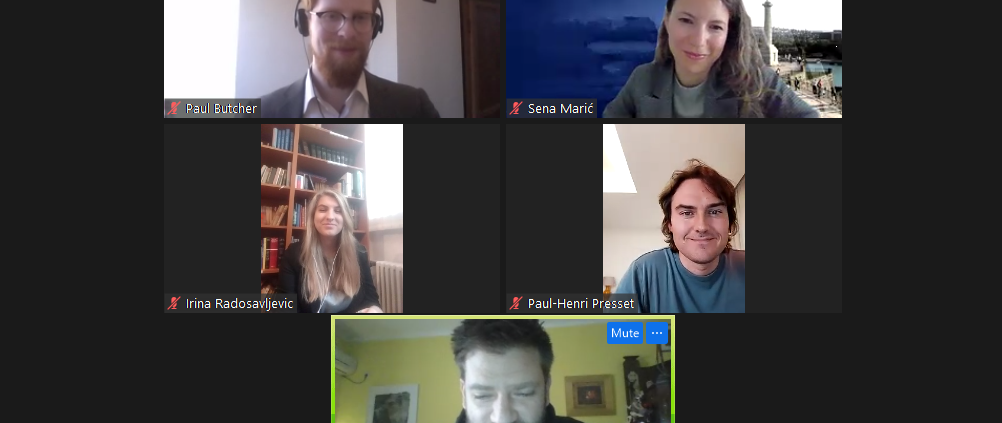Restrictions on freedom of expression on the Internet: censorship or necessity
18 November 2020 – Freedom of expression on the Internet must have some limits, as does freedom of speech, said participants in today’s online panel Freedom of expression on the Internet: A common challenge for Serbia and the EU, organised by European Policy Centre (CEP).
The panel consisted of Paul-Henri Presset, Head of Information, Communication and Media at the EU Delegation to Serbia, Paul Butcher, a political analyst at the European Policy Centre (EPC) in Brussels, Viktor Marković, one of the editors of the njuz.net, Nevena Krivokapić Martinović, lawyer and coordinator for freedom of expression and online media at the SHARE Foundation, as well as a youth representative Irina Radosavljević. The discussion was moderated by the programme manager and senior researcher at CEP, Sena Marić.
Irina Radosavljević conveyed the conclusions from the consultations with youth that CEP held the day before this event, and where it gathered 20 young people aged 16 to 24 from all over Serbia.
Most young people, she said, believe that the best solution for regulating speech on the Internet would be the formation of a new independent body specialised for regulating the problematic content on social media platforms such as hate speech and fake news and that REM (Regulatory authority for electronic media in Serbia) should be included in the work of that body. But also, parents need to be informed as much as possible on this topic, she believes.
Establishing a legal framework is something that the SHARE Foundation is also committed to. “And people should definitely be more informed about these topics, especially parents – most parents are not even aware of what is happening on social networks. Media literacy is something that should be mandatory in schools, so through that, both parents and teachers will be more aware of potential problems,” said Krivokapić Martinović. She also mentioned that the owners of large platforms are among the richest people in the world, as well as that they have enormous power to influence world events. “One of the good ways in which EU regulations have helped ordinary citizens protect themselves is the GDPR,” said Krivokapić Martinović. She added that SHARE is in favour of passing a new Law on Public Information and Media, which would recognise and thus regulate social media platforms, although they are not “media” in the traditional sense of the word.
Viktor Marković, an editor of the website which deliberately makes “fake news” and reacts to real events with satire, noted that older people are most often “victims” of fake news and that it is necessary to talk more about the problem. “I think that education is the most important thing here. Regulation by the state or an international organisation is not the solution, I think things would get worse then. The problem is that people who have no experience are ready to believe in everything, and it is necessary to educate them to check the source before they believe in something and share it further. We, for example, do not believe in any news at first glance and we always check the sources well, because several times we have reacted with satirical fake news to the news that was actually – fake,” he said.
The way people communicate on the Internet is a relatively new way of communicating and we are still not aware of all the negative sides, Presset believes.
“The European Union is working to identify problems and reduce negative practices seen online – fake news, breaches of privacy, cyberbullying…,” he said.
He also mentioned that none of these things are new – only the environment in which it takes place has changed, that is, it is no longer live.
“Article 10 of the European Declaration of Human Rights talks about restrictions on freedoms, when, for example, security is at stake. Freedom of speech, therefore, has been restricted for a long time, in a way – now we are only trying to apply that in another environment. The EU has a responsibility not to control the internet, but to protect human rights.”
Paul Butcher said that we must not forget that social media platforms have many advantages and that there is a reason why we spend so much time on them. “The question is how to establish borders – what is just humour, as in the example of njuz.net in Serbia, and what is false guidance of people.” He noted that, despite the fact that the EU encouraged the platforms to be more responsible, it did not give enough results.
“So, it is necessary to regulate the Internet with a framework in which there will be clear guidelines on what we can and cannot do. Platforms would be required to sign that document,” Butcher suggests.
“The Western Balkans and Serbia are in an even more vulnerable position than the EU, because media literacy is lower than in other parts of Europe, and the political situation is such that, unfortunately, it affects the flourishing phenomenon of fake news and the spread of misinformation, “Bucher said.
“Unfortunately, no one is immune to this phenomenon – and now, during the coronavirus pandemic, we have seen how fake news can also endanger public health, and not just affect political attitudes,” he said.
Watch the video from the event here.
This event is part of the project Make Future Together: EU and the Western Balkans from the Youth Perspective, implemented by a network of think tanks from 6 countries in the region (Think for Europe Network – TEN) together with International Affairs Institute in Rome, Bronislaw Geremek Foundation in Warsaw and European Policy Centre (EPC) in Brussels. The project is funded by the Education, Audiovisual and Culture Executive Agency (EACEA) through the Europe for Citizens program.

